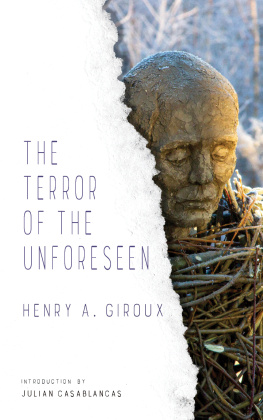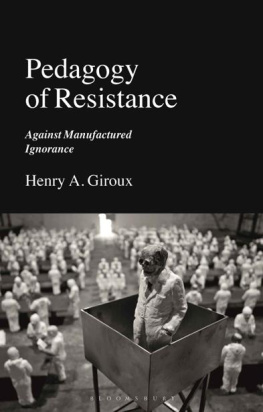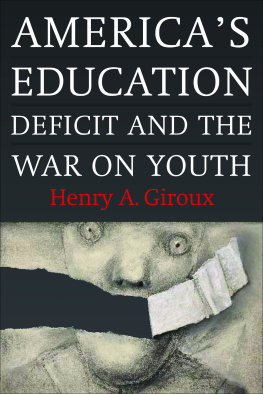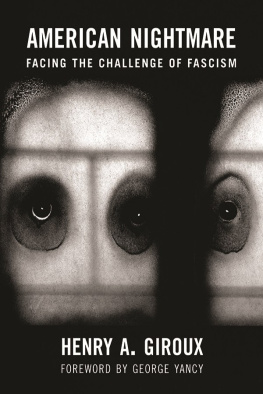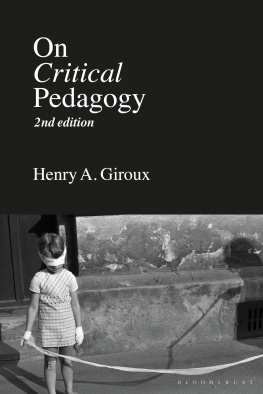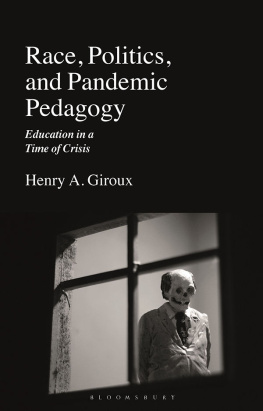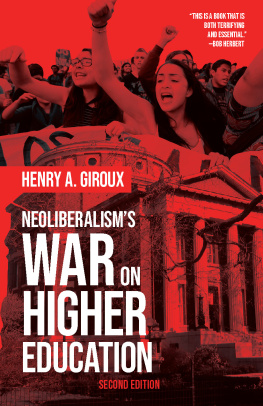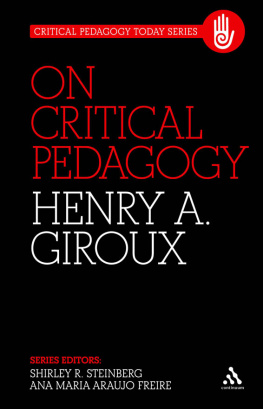Henry A. Giroux - Teachers as Intellectuals: Toward a Critical Pedagogy of Learning
Here you can read online Henry A. Giroux - Teachers as Intellectuals: Toward a Critical Pedagogy of Learning full text of the book (entire story) in english for free. Download pdf and epub, get meaning, cover and reviews about this ebook. year: 1988, publisher: Praeger, genre: Politics. Description of the work, (preface) as well as reviews are available. Best literature library LitArk.com created for fans of good reading and offers a wide selection of genres:
Romance novel
Science fiction
Adventure
Detective
Science
History
Home and family
Prose
Art
Politics
Computer
Non-fiction
Religion
Business
Children
Humor
Choose a favorite category and find really read worthwhile books. Enjoy immersion in the world of imagination, feel the emotions of the characters or learn something new for yourself, make an fascinating discovery.
- Book:Teachers as Intellectuals: Toward a Critical Pedagogy of Learning
- Author:
- Publisher:Praeger
- Genre:
- Year:1988
- Rating:3 / 5
- Favourites:Add to favourites
- Your mark:
- 60
- 1
- 2
- 3
- 4
- 5
Teachers as Intellectuals: Toward a Critical Pedagogy of Learning: summary, description and annotation
We offer to read an annotation, description, summary or preface (depends on what the author of the book "Teachers as Intellectuals: Toward a Critical Pedagogy of Learning" wrote himself). If you haven't found the necessary information about the book — write in the comments, we will try to find it.
Teachers as Intellectuals: Toward a Critical Pedagogy of Learning — read online for free the complete book (whole text) full work
Below is the text of the book, divided by pages. System saving the place of the last page read, allows you to conveniently read the book "Teachers as Intellectuals: Toward a Critical Pedagogy of Learning" online for free, without having to search again every time where you left off. Put a bookmark, and you can go to the page where you finished reading at any time.
Font size:
Interval:
Bookmark:




AS INTELLECTUALS
EDITED BY PAULO FREIRE & HENRY A. GIROUX

EDUCATION UNDER SIEGE
The Conservative, Liberal & Radical Debate Over Schooling
STANLEY ARONOWITZ & HENRY A. GIROUX
CRITICAL PEDAGOGY & CULTURAL POWER
DAVID W. LIVINGSTONE & CONTRIBUTORS
LITERACY
Reading The Word & The World
PAULO FREIRE & DONALDO MACEDO
THE POLITICS OF EDUCATION
Culture, Power & Liberation
PAULO FREIRE
WOMEN TEACHING FOR CHANGE
Gender, Class & Power
KATHLEEN WEILER
THE MORAL AND SPIRITUAL CRISIS IN EDUCATION
A Curriculum for Justice & Compassion in Education
DAVID PURPEL
BROKEN PROMISES
Reading Instruction in Twentieth-Century America
PATRICK SHANNON
EDUCATION & THE AMERICAN DREAM
Conservatives, Liberals & Radicals Debate the Future of Education
HARVEY HOLTZ & ASSOCIATES
POPULAR CULTURE & CRITICAL PEDAGOGY
Schooling & the Language of Everyday Life
HENRY GIROUX, ROGER SIMON & CONTRIBUTORS
AS INTELLECTUALS
Of Learning
HENRY A. GIROUX
Introduction by Paulo Freire
Foreword by Peter McLaren

CRITICAL STUDIES IN EDUCATION SERIES


This book is dedicated to my three children, Jack, Chris, and Brett, who have provided are with a deeper understanding of what it means to struggle for a better future for all children.
It is also dedicated to my sitter, Linda Barbery, whose courage is a constant source of inspiration for me, and to Donaldo Macedo, my brother and friend, whose intelligence and generosity of spirit provide me with a constant source of strength and pleasure.
ix
xxiii
xxvii
xxix
Section One / Rethinking the Language of Schooling
Chapter 1 I
Chapter 2 11
Chapter 3 21
Chapter 4 43
Section Two / Literacy, Writing, and the Politics of Voice
Chapter 5 54
Chapter 6 74
Chapter 7 86
Chapter 8 108
Section Three / Teaching, Intellectual Work, and Education as Cultural Politics
Chapter 9 121
Chapter 10 129
Chapter 11 143
Chapter 12 158
Section Four / Toward a Language of Critique and Possibility
Chapter 13 177
Chapter 14 186
Chapter 15 196
Chapter 16 204
Critical Theory and
the Meaning of Hope
By PETER MCLAREN
The task of providing a comprehensive intellectual profile of Henry Giroux is not easy in such a short space. (Even under optimal conditions, critics would be hard pressed to do justice to the scope and critical depth of his work.) Therefore what follows is a more modest effort which highlights only some general aspects of Giroux's work, enough, I trust, to provide readers with a theoretical context in which to locate the chapters in this volume.
Giroux's work has, over the past ten years, continued to address issues of theoretical, political, and pedagogical importance. The cumulative effect of his writings has virtually dismantled the received notion of schooling and its relationship to the wider society as one of uninterrupted accord and mutually advantageous arrangement. By arguing against the traditional view of classroom instruction and learning as a neutral or transparent process removed from the juncture of power, history, and social context, Giroux has managed to provide the generative foundations for a critical social theory of schooling which offers a singular challenge to educators, politicians, social theorists, and students alike.'
Critically appropriating new advances in social theory, and developing at the same time new categories of theoretical inquiry, Giroux has effectively challenged the dominant assumption that schools function as one of the major mechanisms for the development of the democratic and egalitarian social order. His analysis of the neoconservative resurgence in education has helped to uncover the logic by which the excellence movement has been able to camouflage its retreat on issues of equity and social reform. In addition, his criticisms of progressives have revealed how many accepted practices among liberal educators-such as institutionalized tracking and structuring the curriculum in accordance with the imperatives of industry-undermine the very democratic values that serve as a basis for the liberal position. Consequently we are shown how the priorities developed by both conservative and liberal educators are often belied by the inequality and hierarchy at the root of the ideologies they so cherish.
What Giroux has accomplished, both politically and pedagogically, has been to unmask the structured inequality of competing self-interests within a social order. He has revealed how the fundamental public services that Americans generally associate with schooling, such as the meritocratic empowerment of all individuals regardless of race, class, faith, or gender, are subverted by the very contradictions which constitute them. In sum, Giroux's work is fundamentally bent on obstructing those prevailing ideological and social practices in schools which are at odds with the goals of preparing all students to be active, critical, and risk-taking citizens. Spanning the wide range of Giroux's interests has been an abiding constant, a liberating intention to empower those who have been bypassed on the road to educational success, those for whom history has exercised a cruel and premature closure on hope. These include both the disaffected and the indigent, together with those whose more privileged class position renders them too insensitive and powerless to take a stand against the inequities and injustices of society.
Giroux's work represents much more than an historical contribution to critical educational theory. For he also has developed a highly original account of the political forms of contemporary schooling, an account which stems from an awareness of the strengths and inadequacies of critical educational theory and an acute sensitivity to the limitations and historical contingency of theory itself. While Giroux's writings disclose a deep theoretical erudition, there are grounds upon which they can and should be challenged and contested as part of an ongoing dialogue. Aspects of his work are not, to be sure, without their critics. This is not the place, however, to dwell on criticisms of Giroux's work as much as to explore it as a body of critical thought that must be read as part of an ongoing project of pedagogical struggle and political empowerment.
Font size:
Interval:
Bookmark:
Similar books «Teachers as Intellectuals: Toward a Critical Pedagogy of Learning»
Look at similar books to Teachers as Intellectuals: Toward a Critical Pedagogy of Learning. We have selected literature similar in name and meaning in the hope of providing readers with more options to find new, interesting, not yet read works.
Discussion, reviews of the book Teachers as Intellectuals: Toward a Critical Pedagogy of Learning and just readers' own opinions. Leave your comments, write what you think about the work, its meaning or the main characters. Specify what exactly you liked and what you didn't like, and why you think so.


